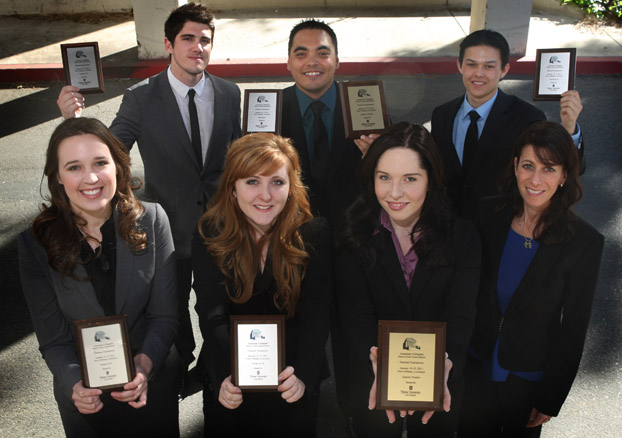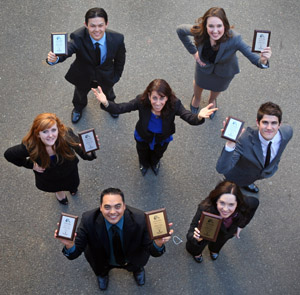 Caption: Proudly showing off their winning plaques are, from left, back row, Sean Moradian, Brian Del Vecchio and Stephen D. Simpson; front row, Cate Sauter, Amy M.Bailey and Dallis Cavallaro with Pamela Fiber-Ostrow, moot court coach. Photo by Karen TapiaDownload Photo
Caption: Proudly showing off their winning plaques are, from left, back row, Sean Moradian, Brian Del Vecchio and Stephen D. Simpson; front row, Cate Sauter, Amy M.Bailey and Dallis Cavallaro with Pamela Fiber-Ostrow, moot court coach. Photo by Karen TapiaDownload Photo
Nothing to Be Moot About
Political Science Student Named Seventh in the Nation
With his palms dripping in sweat and his heart pounding wildly, Brian Del Vecchio stepped to the podium. But, just as the judges walked in and he prepared to deliver his opening statement on affordable health care legislation, he said he was hit with “an overwhelming sense of calmness.”
His demeanor and persuasive arguments for and against the health care bill won over the judges of this year’s American Collegiate Moot Court Association Championship, who named him the seventh best orator in the country.
To place in the top 10 nationwide is an honor for Cal State Fullerton, which created a moot court team only four years ago, said Pamela Fiber-Ostrow, team coach and assistant professor of political science.
“These tournaments are really super competitive with some schools spending thousands of dollars to prepare their students,” she said. “The winning colleges are all private or bigger universities with law schools to draw coaches from so, for us, it’s a big deal. … It’s only our fourth year and, while every year we’ve qualified a team for nationals, this is the first year we’ve come so close to winning regionals — coming in second place — and advancing so far in nationals.”
Del Vecchio, a senior political science major and president of the university’s student Moot Court Club, led the team as its captain.
He and five other students brought home award plaques from the national competition, where they competed as pairs. Del Vecchio got two awards — one for being a Top 10 orator and the other for advancing to the quarterfinal round with his partner, psychology major Dallis Cavallaro. Also receiving awards for advancing in the competition, though not as high as Del Vecchio and Cavallaro, were political science major Amy M. Bailey, who was ranked 19th best orator, and her partner, political science major Stephen D. Simpson; and history major Cate Sauter and her partner, political science major Sean Moradian.
“Entering the nationals competition, Fullerton was seated in the lower half of the top 64 teams in the nation,” Del Vecchio said. “By the end of the first day of competition, three of our four teams advanced to elimination rounds.”
The teams that emerged for the second day of competition were then seated: third — Del Vecchio and Cavallaro, fifth — Bailey and Simpson and seventh — Sauter and Moradian. Sauter and Moradian were eliminated in the double octifinal round; Bailey and Simpson lost in the octifinal round. Del Vecchio and Cavallaro made it to the quarterfinal round before being eliminated by a team from Patrick Henry College who ultimately reigned as the champions.
“Just before the closing ceremonies, the president of American Collegiate Moot Court Association presented the forecast of the coming years in which he acknowledged Cal State Fullerton as the ‘new power house’ in undergraduate moot court,” Del Vecchio said.
The students’ success is due to countless hours of preparation over eight months, Fiber-Ostrow said, adding that students begin preparing by enrolling in her class, “Legal Practicum Moot Court.”
“This highly participatory seminar incorporates interactive classroom exercises, written homework assignments, in-depth case analysis and mock appellate trials to introduce students to legal research, reasoning and writing,” Fiber-Ostrow said about the class. “Students learn about appellate court and trial strategies and systems of legal education, while gaining an in-depth knowledge of civil liberties law.”
For each year’s moot court competition, students team up in pairs and study a hypothetical case. Through research, they develop legal and policy arguments on both sides of the issue. During competition, they argue the case against other teams in front of a panel of judges in a mock Supreme Court hearing. This year’s cases called for the presentation of oral arguments on whether the U.S. Constitution forbids states to refuse to legally recognize the validity of marriages involving persons of the same sex and whether the U.S. government, in enacting the Affordable Health Care Act, exceeded its constitutional powers.
Del Vecchio, who argued for and against the Health Care Act, said that while there wasn’t one particular argument that clinched his spot on the Top 10, or All American, orator list, the judges were impressed with his conversational delivery as he pointed out real-world implications of the case.
“When speaking on behalf of Congress in defense of the Affordable Health Care Act, the judges were receptive to my portrayal of the bill as more than just money, but rather legislation more akin to the Civil Rights Act, the Americans with Disabilities Act and other forms of ‘it’s just right’ legislation,” he said.
Most of the students who get involved in moot court are aspiring lawyers, Fiber-Ostrow said.
Del Vecchio, who plans to complete his undergraduate degree this summer, said he will be spending the next year studying for the Law School Admission Test and then applying to law schools, and perhaps following in the footsteps of his favorite orator — John F. Kennedy.
Feb. 10, 2011
 Moot Court Team award winners, from top left, clockwise, Stephen D. Simpson, Cate Sauter, Sean Moradian, Dallis Cavallaro, Brian Del Vecchio and Amy M. Bailey. In the middle is Moot Court Coach Pamela Fiber-Ostrow. Photo by Karen Tapia
Moot Court Team award winners, from top left, clockwise, Stephen D. Simpson, Cate Sauter, Sean Moradian, Dallis Cavallaro, Brian Del Vecchio and Amy M. Bailey. In the middle is Moot Court Coach Pamela Fiber-Ostrow. Photo by Karen Tapia